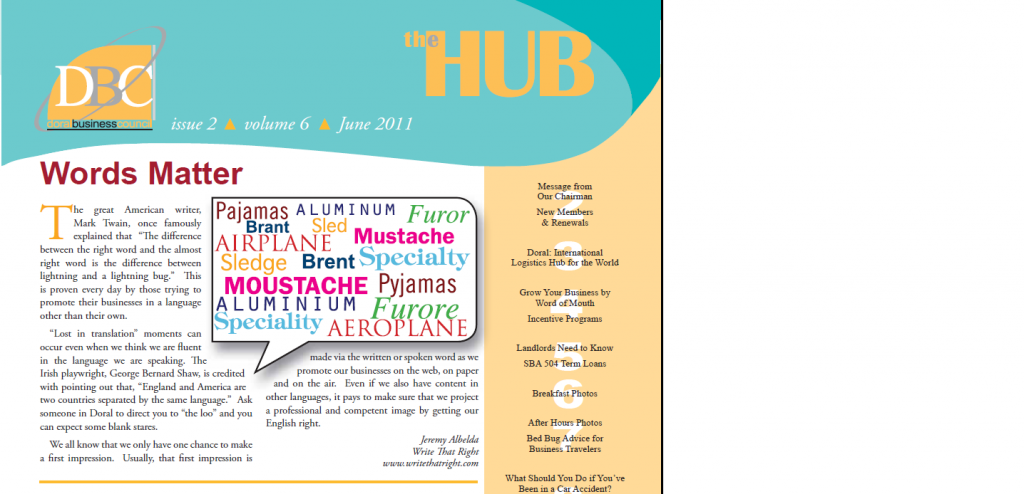
1. You just aren’t any good at it
Talent is about 90% a function of putting in the work, but it’s hard to put the work in for something you don’t feel any connection with. Plus, sometimes you have a pressing need where you don’t have time to get good enough to do it yourself.
Lots of people hate to write. If it’s just a phobia about hitting those keys, you can try speech recognition software, which can be a fantastic time-saver. But if the thought of writing is about as appealing as dental surgery, you’ll never put the work in to get good.
Do more of what you’re good at and less of what you hate. If writing isn’t for you, hire or partner with a really good writer to make sure that part of your business is getting the attention it needs.
It doesn’t matter how fantastic your product or service is if you can’t communicate that to customers. Every company needs to communicate a powerful message — and that means you need strong writing.
2. You don’t have the bandwidth
Even if you love writing, there’s a limit to how many words we can consistently get onto the page or screen every day. Marathon writing sessions can work for some people, but they can also lead to burnout and sabotage your productivity in the long term.
Professional copywriters know “the more you tell, the more you sell.” And that’s even more true in the content marketing world — the more high-quality content you can create, the more authority and customer connection you can build.
Just realize that you need to understand the strategy behind the content you’re creating. Don’t add a writer for the sake of getting more words generated. Understand the business purpose behind all the copy you create, whether or not you do the actual writing.
3. You need particular expertise
You may create really good daily content for your blog, but you need a persuasion specialist to write sales letters that convert fans into customers.
Or you may need a subject matter expert to write a white paper.
Or a strong SEO Copywriter to write content that both serves your business needs and can rank well in search engines.
Realize that you’ll pay more for a copywriter with specific expertise, rather than a generalist … just like you pay more for a Mercedes mechanic who’s been in business for 30 years over some kid at the quickie oil change who’s always wanted to try fixing a Mercedes.
4. You’re too close to the topic
The reason it’s so hard to move from features to benefits is that it can be really tough to be objective about your own business.
You know all the blood, sweat, and tears you put in to make your product or service great. (In other words, the features of your business.) You understand the details behind the scenes.
But your customer may have no interest at all in those things. In fact, they might care deeply about something that’s barely on your radar.
Sometimes a pair of outside eyes can be just what you need to communicate your most important benefits. Your winning difference could even be something you take for granted, but that your customers find wildly impressive.
Just make sure that your writer is looking at real customer feedback. This could come from survey responses, from social media listening, or from conducting interviews with customers. Your copywriter should have direct access to real customer language about why people like doing business with you.
5. The stakes are high
If you’ve got a big launch or an important marketing campaign, you need to make sure your copy is making a great impression.
- That means a terrific headline that gets attention immediately.
- It means well-structured content that conveys your authority.
- It means writing that gets to the point without a lot of fluff or verbal clutter.
- It means customer-focused copy that clearly conveys valued benefits.
- It means making sure you know the difference between your and you’re.
Professional copywriters are perfectionists about language. They’re obsessive about tone, subtle shades of meaning, copy structure, and the finer points of grammar and usage.
If that’s not you, you may want to bring in some help. Clunky, error-filled writing is a serious credibility killer.
But … the message still belongs to you
While a talented, well-trained copywriter can help you find your strongest possible marketing message, ultimately that message does need to come from you.
You know the customer you want to reach. You know the little details that will make your copy more interesting. No one will ever know your business like you do, and you need to recognize the hidden remarkable benefit that becomes your best marketing story.
That’s why it pays to study copywriting and marketing even if you turn over every word to someone else. A terrific copywriter can make you sound fantastic — but as the business owner, you’re the one who’s ultimately responsible for your story.
Content from Copyblogger Media













